Illinois Rental Agreement
 Lease Agreement Template_1 on iPropertyManagement.com" width="1224" height="1584" />
Lease Agreement Template_1 on iPropertyManagement.com" width="1224" height="1584" />
An Illinois rental agreement is a legal contract between a landlord overseeing a rental property and a tenant who wishes to use it. Illinois landlord-tenant law governs these agreements; rental terms must be within the limits allowed by law.
Illinois Rental Agreement Types
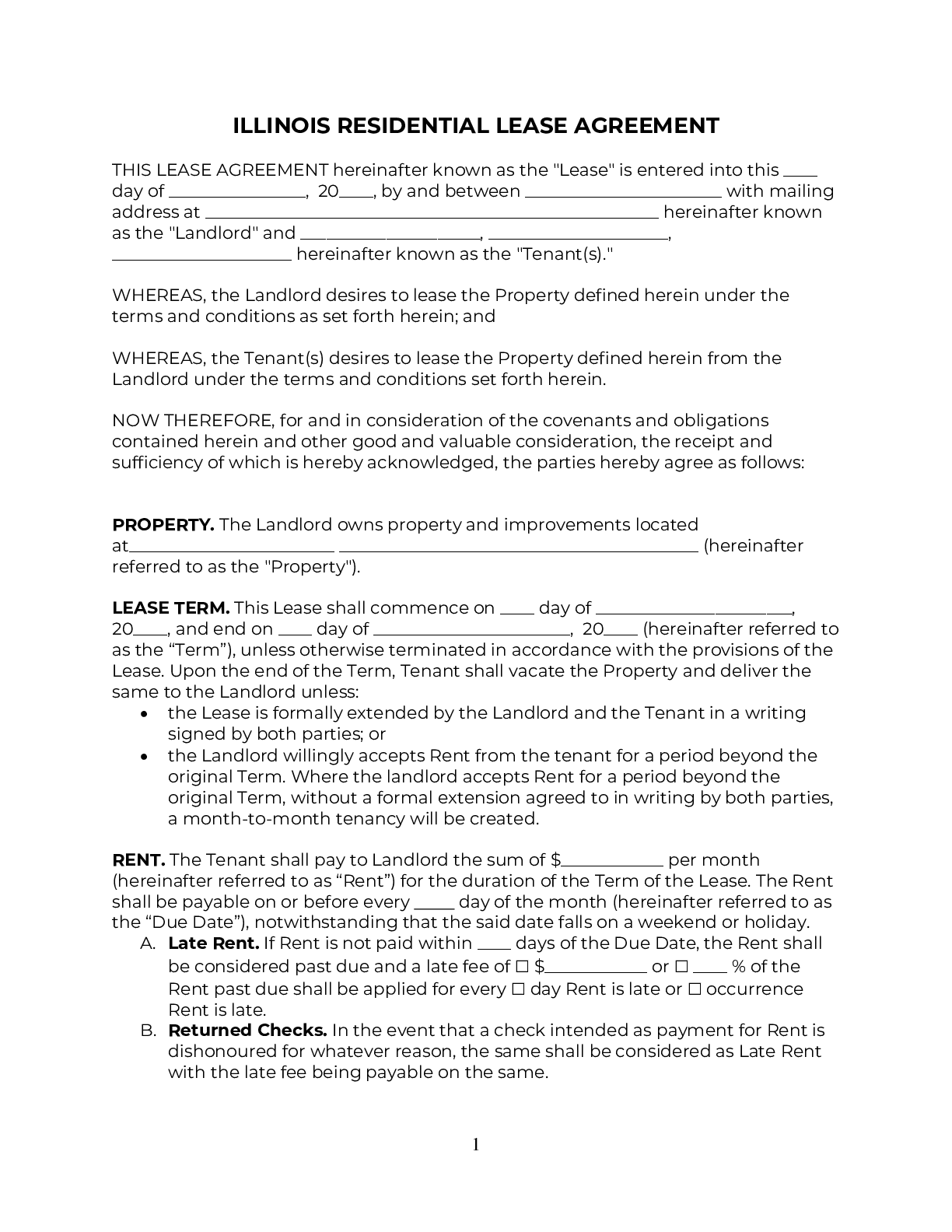
An Illinois residential lease agreement (“rental agreement”) is a legal contract for a tenant to rent a residential property from a landlord, subject to terms and conditions agreed by all parties.
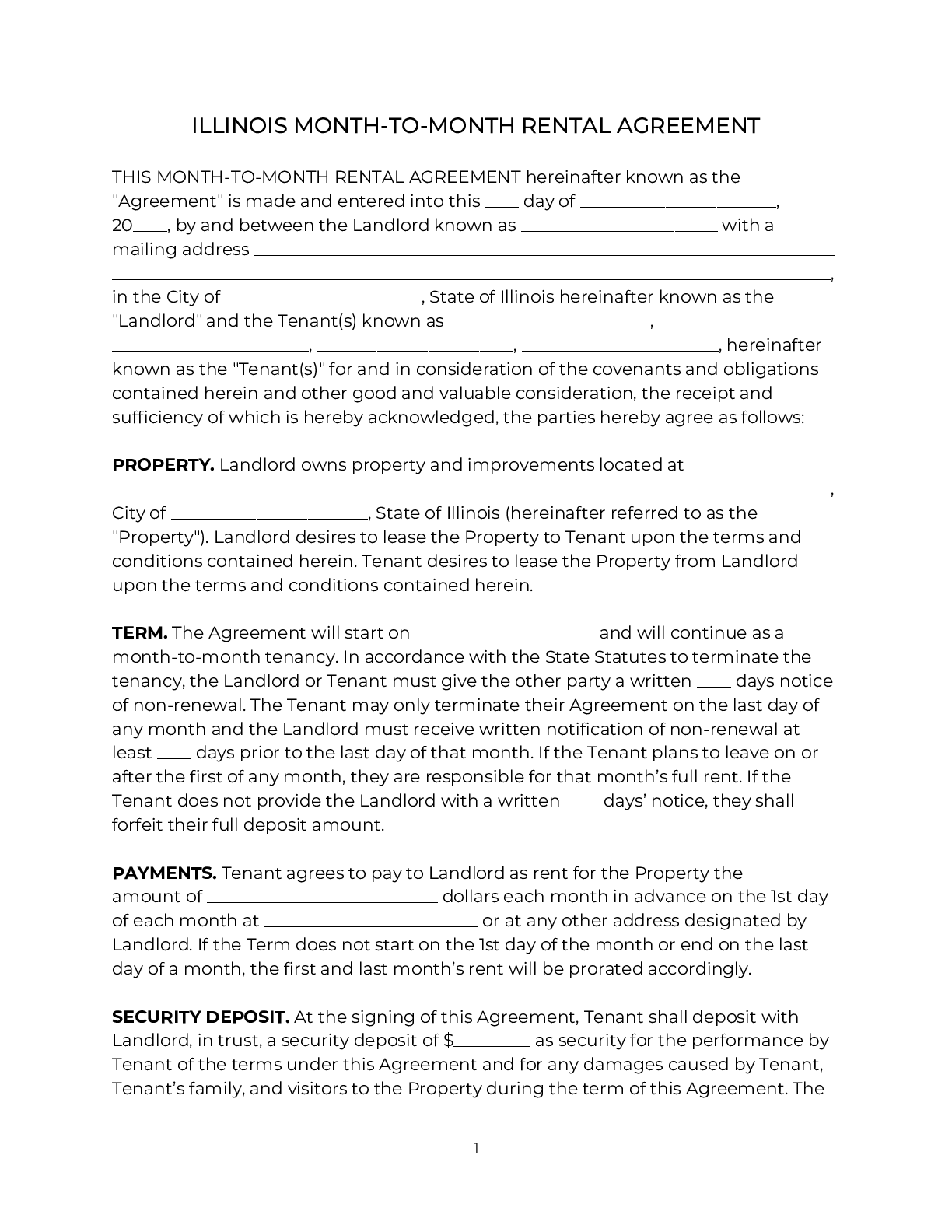
An Illinois month-to-month lease agreement is a contract (not necessarily written) where a tenant rents property from a landlord. The full rental term is one month, renewable on a month-to-month basis.
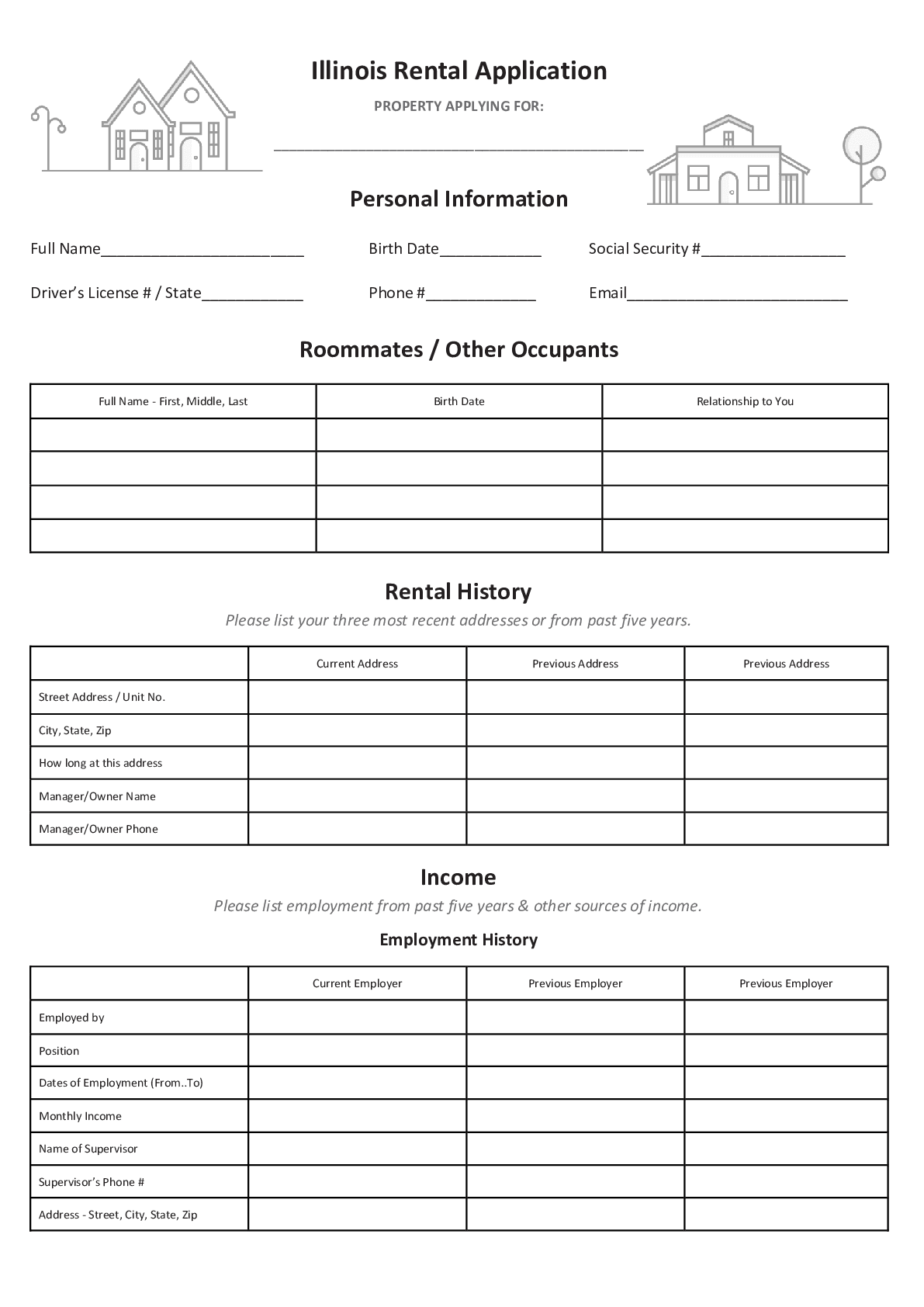
Illinois landlords may use a rental application form to screen prospective tenants. A rental application collects information relating to finances, rental history, and past evictions.
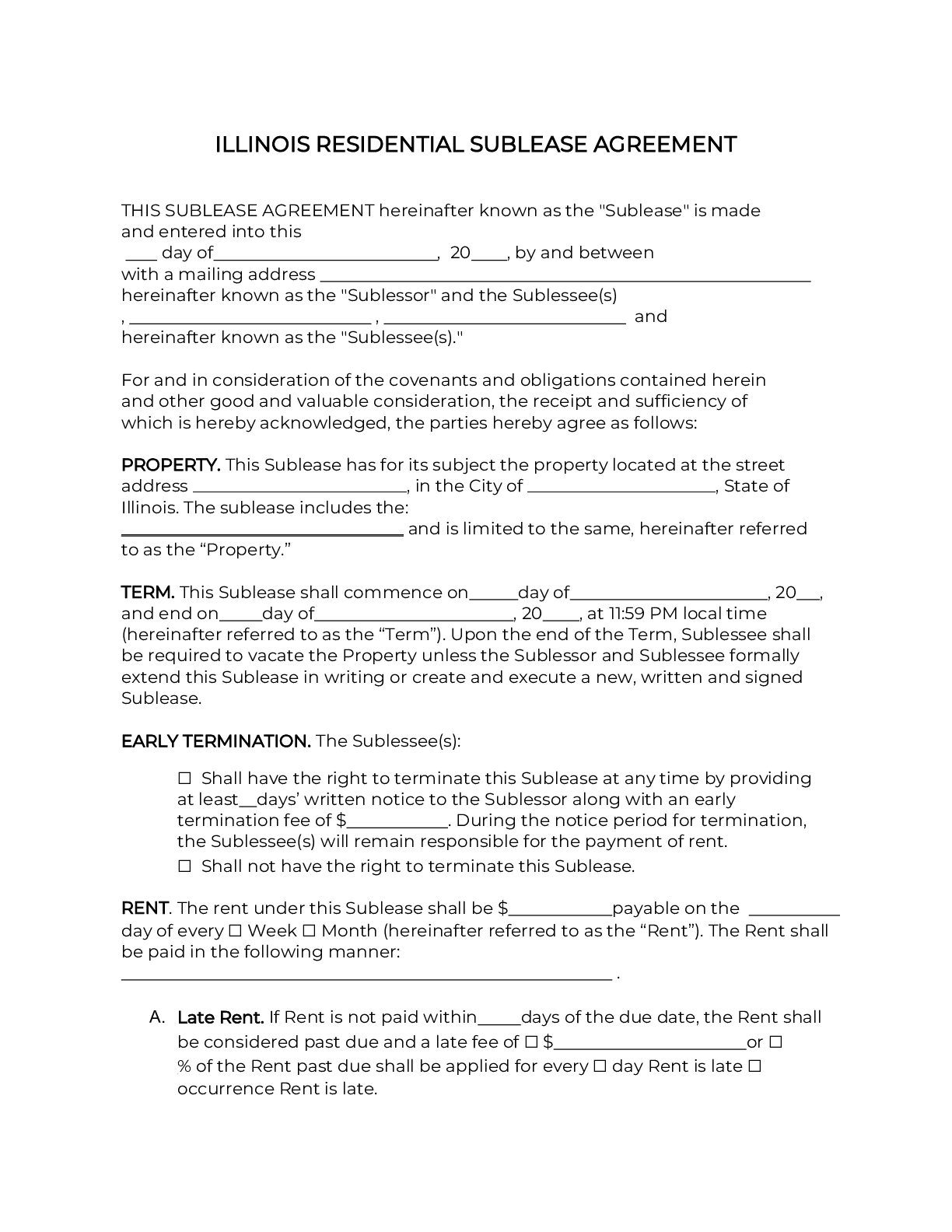
An Illinois sublease agreement is a legal contract where a tenant ("sublessor") rents (“subleases”) property to a new tenant (“sublessee”), usually with the landlord’s permission.
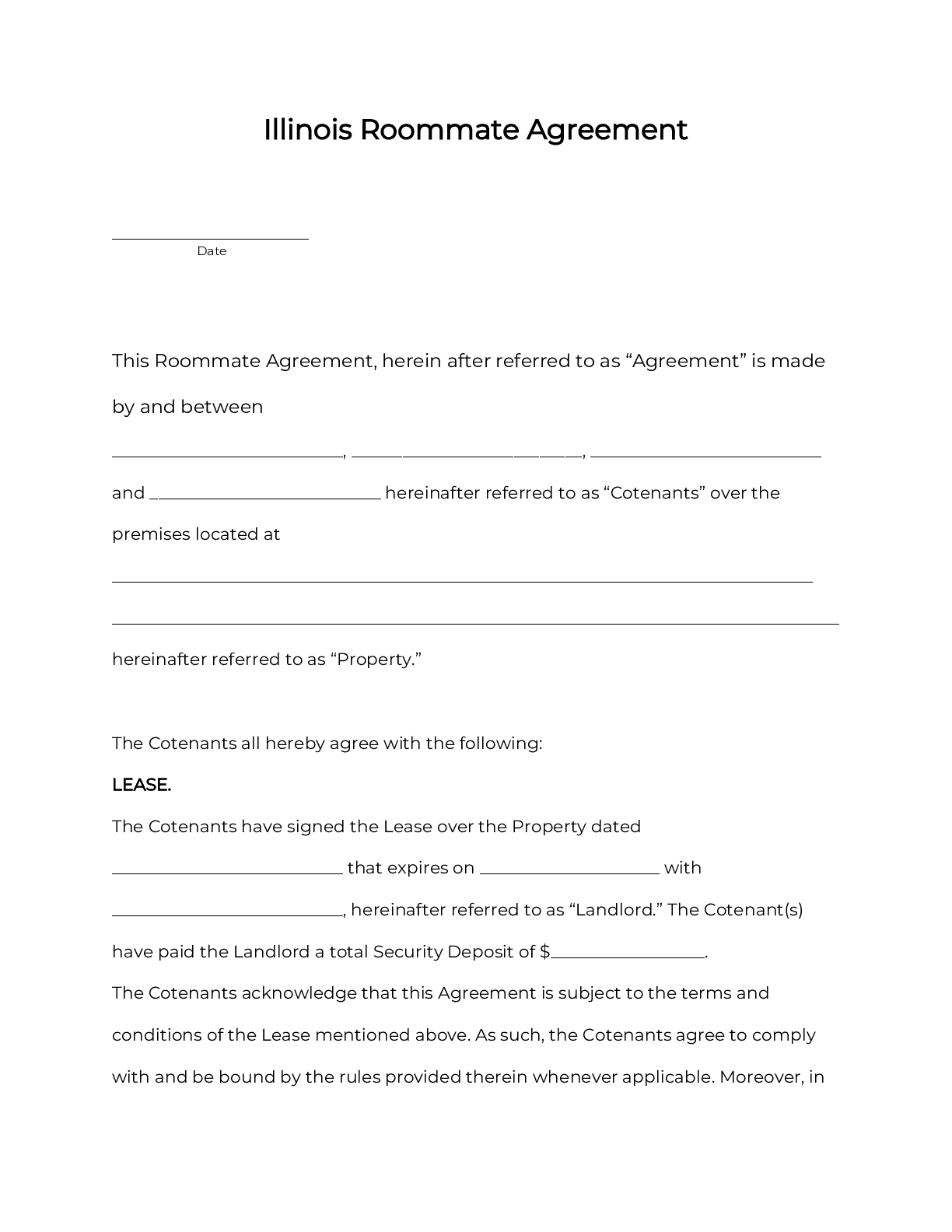
An Illinois roommate agreement is a legal contract between two or more people (“co-tenants”) who share a rental property according to rules they set, including for things like splitting the rent. This agreement binds the co-tenants living together, and doesn’t include the landlord.
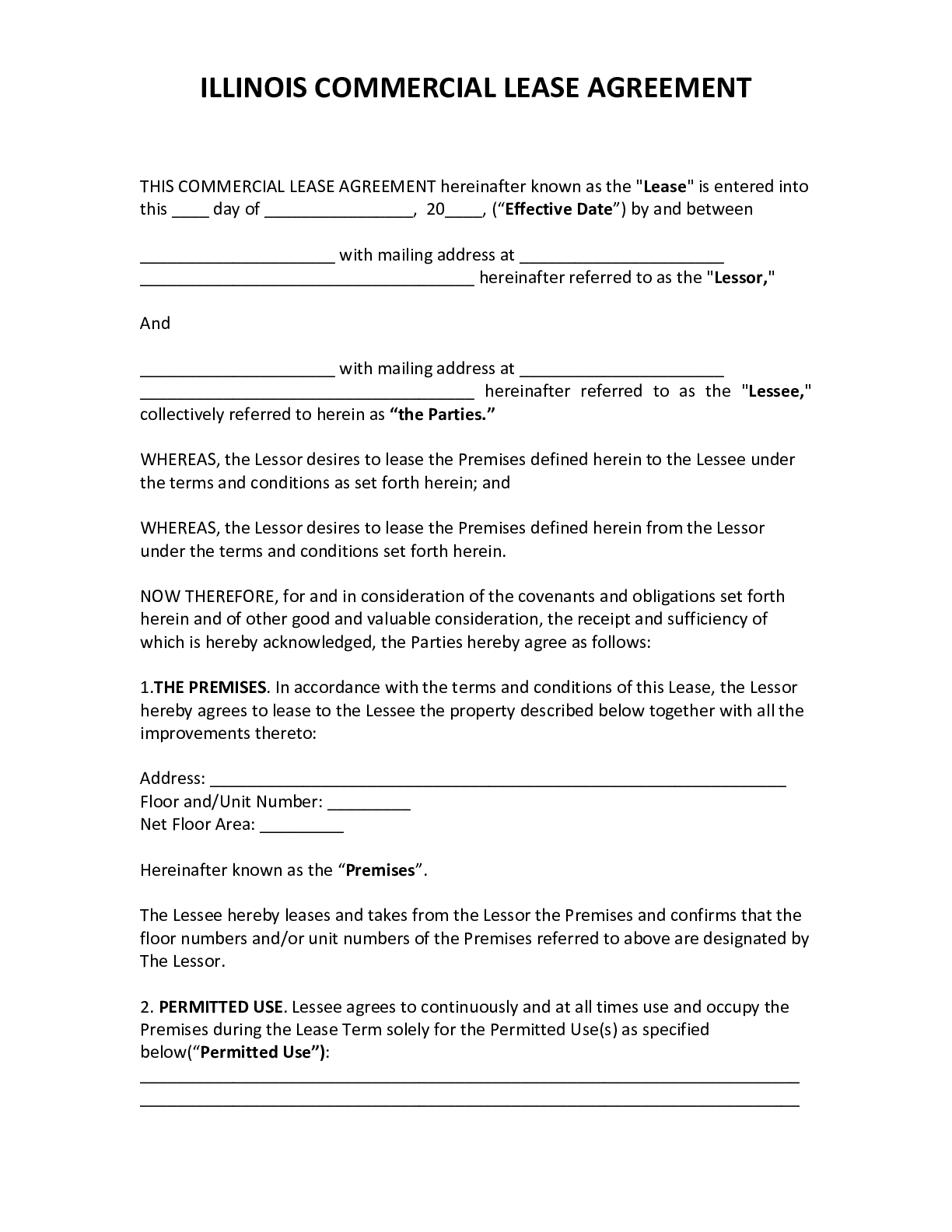
An Illinois commercial lease agreement is a legal contract arranging the rental of commercial space between a landlord and a business.
Common Residential Rental Agreements in Illinois
- Illinois (City of Evanston) Model Lease Agreement – this form is specific to residential rental property in the City of Evanston. It outlines the Evanston Residential Landlord and Tenant Ordinances as well as Illinois state law. This model lease is written with an easy-to-read approach and extensive rules and procedures regarding issues like habitability and tenant obligations.
- University of Chicago Model Lease Agreement – this agreement, written by the University of Chicago, is suitable for basic residential purposes. It covers basic terms and conditions, as well as some less common ones like waterbeds.
Illinois Required Residential Lease Disclosures
- Radon Hazard Disclosure(required for all leases) – Illinois landlords must provide all new tenants with a state-approved pamphlet warning about the dangers of radon exposure, plus copies of any records or reports which might indicate a radon hazard on the premises. [1]
- Carbon Monoxide (required for some leases) – Illinois landlords must provide information regarding a property’s carbon monoxide alarm testing and maintenance, in compliance with the Carbon Monoxide Detector Act.
- Smoke Detector (required for all leases) – Illinois landlords must provide information regarding a property’s smoke detector testing and maintenance, in compliance with the Smoke Detector Act.
- Concession Granted (required for some leases) – Illinois landlords must disclose in the written lease any concession for rent that is granted by the landlord.
- Shared Utility Arrangements(required for some leases) – Illinois properties without individual utility metering must include a breakdown of shared utilities alongside copies of the bill, and terms for rent reduction (if applicable).
- Lead-Based Paint Disclosure(required for some leases) – For any property built before 1978, federal law requires that an Illinois residential lease must contain a lead-based paint disclosure with an EPA informational pamphlet, plus notice of any lead hazards on the property.
To learn more about required disclosures in Illinois, click here.
Some Illinois cities, like Chicago , have more comprehensive rules than the statewide standard. Always check local laws.
Illinois Landlord Tenant Laws
- Warranty of Habitability – Illinois landlords can only rent out habitable property, which means providing certain features essential to basic health and safety. This includes things like heat, plumbing, electricity, and sound structural elements. Landlords must repair any issues within 14 days after proper notice from the tenant. Failure to repair lets a tenant repair and deduct from the rent, or report the landlord to housing authorities. Tenants in Illinois can’t easily terminate their leases early or withhold rent.
- Evictions – Illinois landlords may evict for rent default, lease violations, or illegal acts, among other things. Before filing eviction, landlords must serve tenants with prior notice to pay or quit, depending on the eviction type. This means most evictions in Illinois take a matter of weeks. However, Illinois properties covered by the federal Coronavirus Aid, Relief, and Economic Security (CARES) Act are federally entitled to a minimum 30 days of advance notice before a landlord can file eviction for nonpayment of rent or fees, which can extend the eviction process.
- Security Deposits – Illinois does not set a maximum cap on the amount of a security deposit. Upon lease termination, a landlord has 30 days to return a security deposit, or 45 days to return any unused portion if making deductions.
- Lease Termination – Illinois allows tenants to terminate a month-to-month lease with 30 days of advance notice. A fixed-term lease can’t be terminated early without active military duty, landlord harassment, uninhabitable property, or domestic abuse.
- Rent Increases and Fees – Illinois landlords can raise rent by any amount, whenever they want, with no particular requirements for justification or advance notice. Late fees in Illinois must be “reasonable.” The state does not regulate returned check fees.
- Landlord Entry – Illinois landlords may enter rental property for purposes reasonably related to the tenancy, such as maintenance and inspections. The state does not specify entry requirements, which means that a landlord can enter at reasonable times of day using reasonable advance notice (customarily at least 24 hours), unless the lease agrees otherwise. Entry requirements are temporarily suspended in emergency situations.
- Settling Legal Disputes – Illinois allows its small claims courts to hear landlord-tenant disputes, as long as the amount in controversy is under $10,000.
To learn more about landlord tenant laws in Illinois, click here.
Sources
(a) At the time of a prospective tenant’s application to lease a dwelling unit, before a lease is entered into, or at any time during the leasing period, upon request, the lessor shall provide the prospective tenant or tenant of a dwelling unit with:
(1) the Illinois Emergency Management Agency pamphlet entitled “Radon Guide for Tenants” or an equivalent pamphlet approved for use by the Illinois Emergency Management Agency; (2) copies of any records or reports pertaining to radon concentrations within the dwelling unit that indicate a radon hazard to the tenant, as provided in subsection (c); and (3) the Disclosure of Information on Radon Hazards to Tenants form, as set forth in subsection (f). (b) At the commencement of the agreed leasing period, a tenant shall have 90 days to conduct his or her own radon test of the dwelling unit. If the tenant chooses to have a radon test performed, the tenant shall provide the lessor with copies of the results, including any records or reports pertaining to radon concentrations, within 10 days after receiving the results of the radon test. If the tenant’s radon test provides a result in excess of the Illinois Emergency Management Agency’s recommended Radon Action Level and the lessor has elected to not mitigated the radon hazard, the tenant may terminate the lease.

 Lease Agreement Template_1 on iPropertyManagement.com" width="1224" height="1584" />
Lease Agreement Template_1 on iPropertyManagement.com" width="1224" height="1584" /> Lease Agreement Template_1 on iPropertyManagement.com" width="1224" height="1584" />
Lease Agreement Template_1 on iPropertyManagement.com" width="1224" height="1584" />




